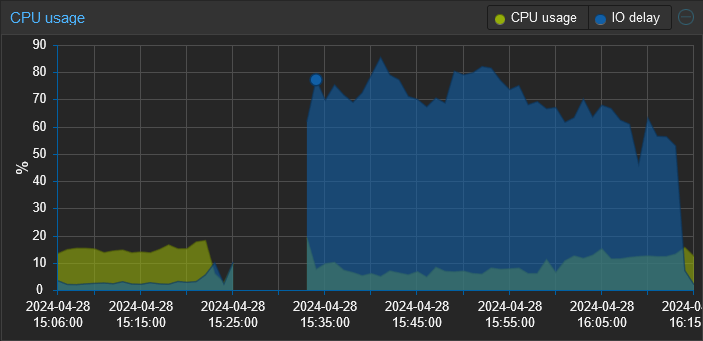I've started encountering a problem that I should use some assistance troubleshooting. I've got a Proxmox system that hosts, primarily, my Opnsense router. I've had this specific setup for about a year.
Recently, I've been experiencing sluggishness and noticed that the IO wait is through the roof. Rebooting the Opnsense VM, which normally only takes a few minutes is now taking upwards of 15-20. The entire time my IO wait sits between 50-80%.
The system has 1 disk in it that is formatted ZFS. I've checked dmesg, and the syslog for indications of disk errors (this feels like a failing disk) and found none. I also checked the smart statistics and they all "PASSED".
Any pointers would be appreciated.

Edit: I believe I've found the root cause of the change in performance and it was a bit of shooting myself in the foot. I've been experimenting with different tools for log collection and the most recent one is a SIEM tool called Wazuh. I didn't realize that upon reboot it runs an integrity check that generates a ton of disk I/O. So when I rebooted this proxmox server, that integrity check was running on proxmox, my pihole, and (I think) opnsense concurrently. All against a single consumer grade HDD.
Thanks to everyone who responded. I really appreciate all the performance tuning guidance. I've also made the following changes:
- Added a 2nd drive (I have several of these lying around, don't ask) converting the zfs pool into a mirror. This gives me both redundancy and should improve read performance.
- Configured a 2nd storage target on the same zpool with compression enabled and a 64k block size in proxmox. I then migrated the 2 VMs to that storage.
- Since I'm collecting logs in Wazuh I set Opnsense to use ram disks for /tmp and /var/log.
Rebooted Opensense and it was back up in 1:42 min.
Quick and easy fix attempt would be to replace the HDD with an SSD. As others have said, the drive may just be failing. Replacing with an SSD would not only get rid of the suspect hardware, but would be an upgrade to boot. You can clone the drive, or just start fresh with the backups you have.
I may end up having to go that route. I'm no expert but aren't you supposed to use different parameters when using SSDs on ZFS vs an HDD?
That's what I'd do here, used enterprise SSDs are dirt cheap on fleaBay